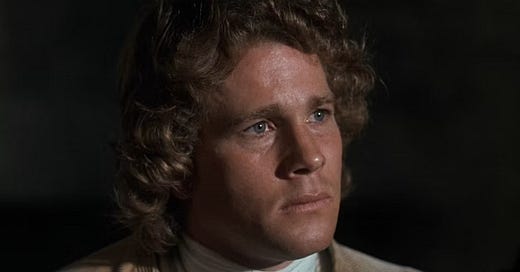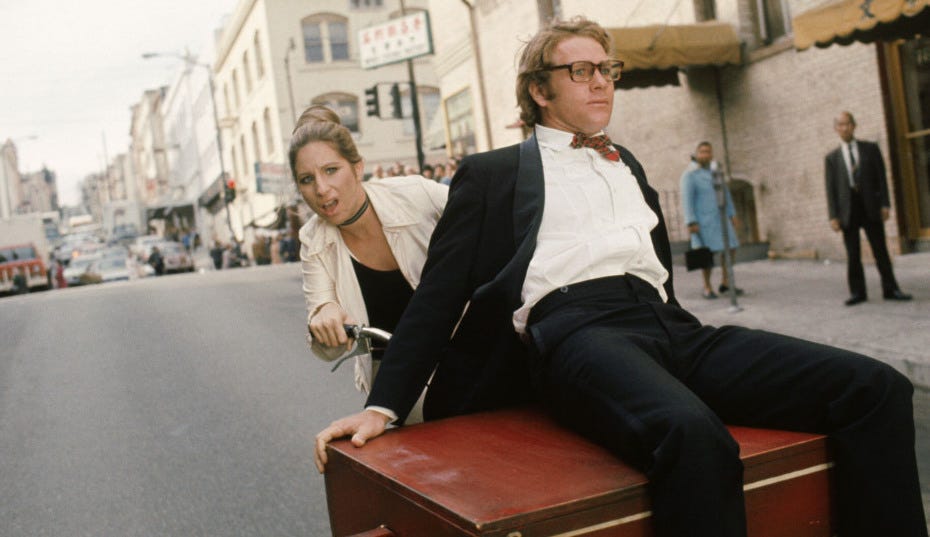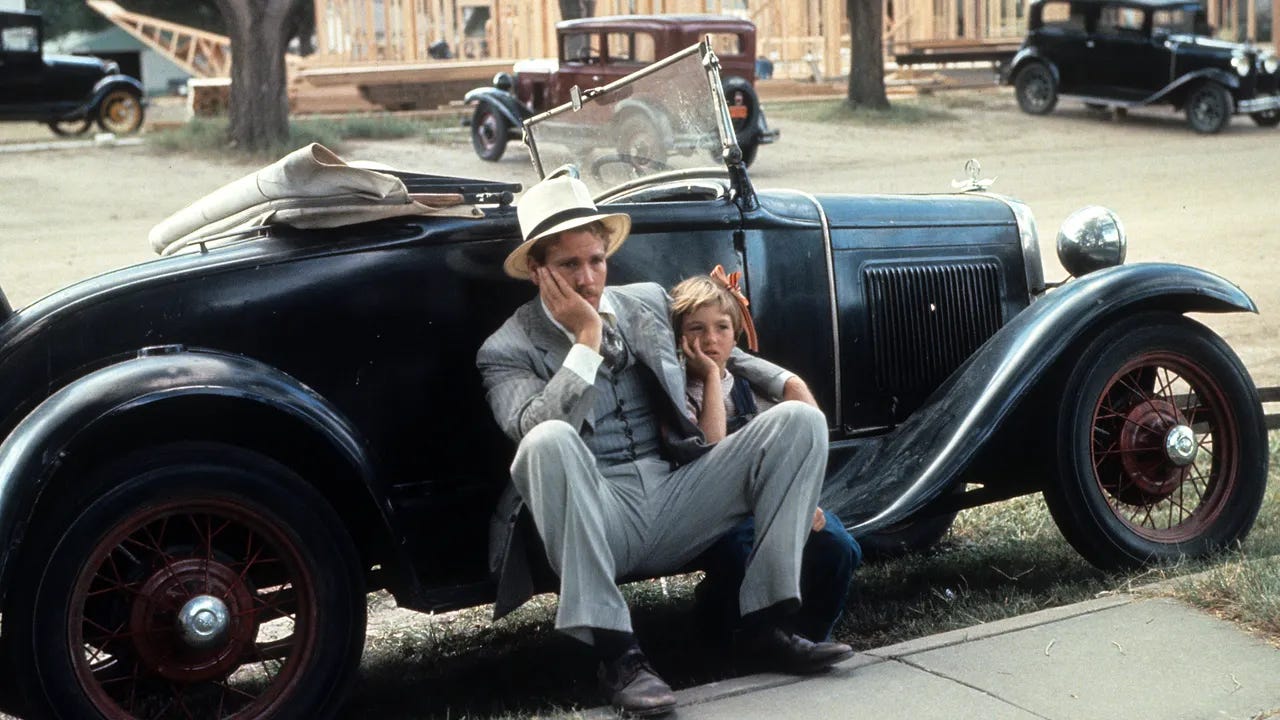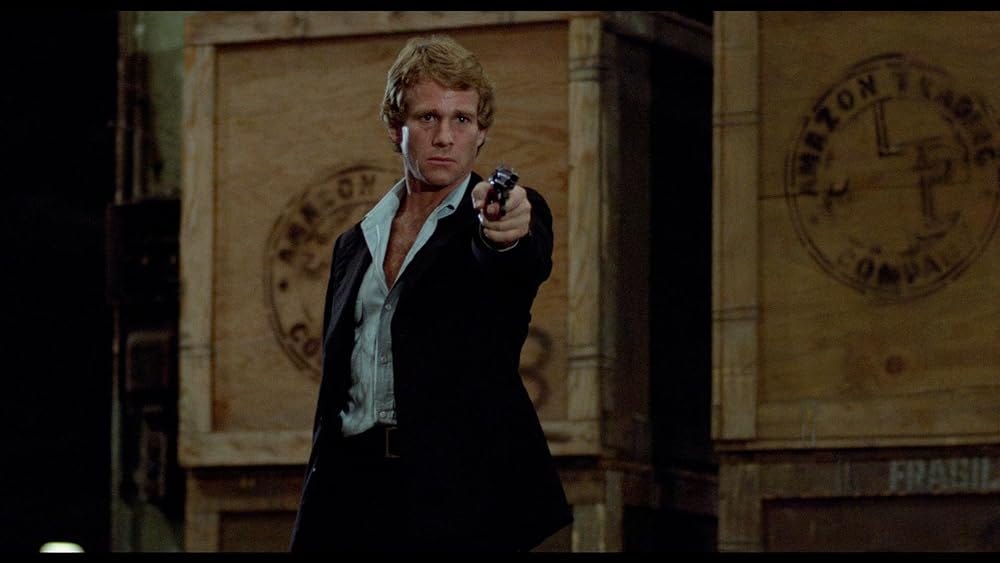Ryan O'Neal: The Wayward Soul of The Auteur Movement
Love Means Eulogizing Your Favorite Actors, Even If It's The Guy from Love Story
Though considered one of his finest films today, Stanley Kubrick’s period opus Barry Lyndon was a considerable disappointment for the director when it was released in 1975. Having become not just an acclaimed director but a Titan of Industry after masterpieces ranging from Dr. Strangelove to 2001: A Space Odyssey, Kubrick missed with critics and audiences for practically the only time in his career, and many fingers pointed to leading man Ryan O’Neal as being one of the culprits responsible. Pauline Kael, one of the film’s most vocal detractors, wrote that O’Neal looked “ looks slack-faced and phlegmatic.”
O’Neal was an easy target, having never exactly been a critical darling in the first place, even despite starring in several heavyweight hits and enduring classics from Paper Moon to What’s Up, Doc? He was one of those actors who was simultaneously Hollywood royalty and an undeniable star, but still one of those icons that snobs could dismiss and never feel the need to take seriously.
Ryan O’Neal starring as the eponymous Barry Lyndon.
After getting his start on the soap opera Peyton’s Place, the Irish-American actor became a star and a sensation after co-starring with Ali McGraw in the ever-popular but oft-mocked melodrama Love Story, ironically his only Academy Award nomination. Then he was seemingly upstaged by his own child, Tatum O’Neal, who won for her dazzling performance in Paper Moon whereas O’Neal wasn’t even nominated. Then he stars in Stanley Kubrick’s only box-office disappointment, something which he himself admitted that his “career never really recovered from.” He managed to gain credibility in some circles for his performance in Walter Hill’s The Driver, a crime-thriller that’s criminally underrated, one that simply didn’t receive enough recognition in the States to turn O’Neal’s reputation around. If the word “Himbo” had been a part of the cultural lexicon back in 1978, you could bet good money that O’Neal would be the face of it.
Now Ryan O’Neal has passed at the age of 82 and his prolific career would appear eclipsed by his turbulent relationship with Farrah Fawcett, his abuse of his daughter Tatum, and for getting into an actual shootout with his own son Griffin. If you pull up all of O’Neal’s obituaries, you’ll see the words “volatile” and “tempestuous” come up a whole lot.
You would imagine that Barry Lydon’s epic re-evaluation, now considered one of Kubrick’s most profound achievements, would translate into more respect for O’Neal’s name. At the very least, more respect for his quietly compelling performance as the titular character. Instead, all the credit for that magnificent turn goes to Stanley Kubrick, who some conspire to have intentionally hired a stiff and flat performer like O’Neal. He pulled a similar stunt of getting O’Neal to give a pitch-perfect performance the same way he literally tricked George C. Scott into hamming up his hysterical role in Dr. Strangelove. Owen Gleiberman of Entertainment Weekly sums this up by saying, “to watch Ryan O’Neal’s performance as the upwardly mobile Barry, part victim and part cad, is to see Kubrick’s perverse genius with actors. He cast a dullard only to jolt us, by the end, with the revelation of the bastard within.”
You can say many things of Ryan O’Neal as both an actor and a human being, but “dull” is certainly not one of them.
It feels odd and even conflicting to eulogize one of the most ill-tempered personalities in Hollywood, a man whose main contribution to cinema is being responsible for one of the cringiest movie quotes ever with “love means never having to say you’re sorry.” The truth is that Ryan O’Neal has lived in my head rent free ever since watching his effortlessly charming performance in Paper Moon, and his dweeby, foppish turn in What’s Up, Doc?
Ryan O’Neal and Barbara Streisand in the slapstick-farce, What’s Up, Doc?
It was actually the latter which introduced me to O’Neal. I watched it with my parents at a young age. In addition to being captivated by the farcical antics and off-the-rails climactic chase sequence, O’Neal instantly caught my attention. Very rarely do you see an actor with his profoundly good looks allow themselves to play the type of wimp that you’d normally associate with Woody Allen, and with such grace and humor. I instantly compared him quite favorably to Cary Grant’s similar nerd-turn in Bringing Up, Baby, and also made the mistake of assuming that he was probably a pretty cool guy in real life. My parents had to inform me that he wasn’t.
My admiration for O’Neal as an actor grew exponentially after watching Paper Moon and not even realizing that it was the same actor as What’s Up, Doc? After watching him in Barry Lyndon, I was ready to declare him as one of the finest actors of his generation. He didn’t have the dynamic quality of an Al Pacino or Jack Nicholson, and his understated approach would make it easy to ignore his talents. Walter Hill noted that in a discussion with Edgar Wright for Empire Magazine, saying of O’Neal: I was very disappointed that people didn't particularly give him any credit for what he did. To me, he's the best he's ever been.” Personally, I don’t know how you can watch Barry Lydon and not marvel at his quiet torment, at the way his eyes scream contempt.
No, there’s a haunting quality to O’Neal. He was impossibly photogenic, intensely sensitive, and beautifully brooding. That’s not to imply that he didn’t have a serious proficiency for comedy as both his collaborations with Peter Bogdanovich would prove. Well, I say “both” but O’Neal had actually worked with Bogdanivch a third time on the flop, “Nickelodeon.” Even as an O’Neal apologist, I wouldn’t recommend you seek this one out unless you basically want to watch a salivating tribute to D.W. Griffith. Which, you know, you shouldn’t.
All of this adoration for O’Neal isn’t an excuse for the wretched way he treated people, and I’m certainly not asking anyone to overlook the abuse he inflicted on his own family to better appreciate his legacy as an actor. Quite frankly, the story of Ryan O’Neal is a tragedy. A man born to be a movie star, a man who had the talent to be regarded as an equal to Robert Redford. Quite honestly, he was a more sophisticated actor than Redford. I can’t imagine Redford yielding his cool to play the scoundrels and goofballs that O’Neal played with such vulnerability.
Ryan O’Neal with his daughter Tatum in Paper Moon, the film that would make her the youngest Academy-Award winner in history.
Unfortunately, O’Neal will be just as remembered for being a tabloid rogue whose self-destructive tendencies led to his downfall, not unlike one of my other favorite actors: Mickey Rourke. His fall from grace wasn’t quite as public and explosive as Mickey Rourke’s. Ryan O’Neal didn’t quit acting to get his face mangled by heavyweight boxers for four years, at least. But his interior life was just as ugly. Made all the uglier by the total clash of his personal foibles with that of his screen persona. How could a man with such a gentle voice be such a right ol’ bastard?
After his star peaked in the ‘70s, O’Neal never exactly got his comeback vehicle the way that Mickey Rourke did with The Wrestler. By that point, his reputation had been all but consumed by his personal life. He did have a respectable supporting role in Chances Are with a young Robert Downey Jr. The closest thing he has to a major comeback is the growing stature of The Driver, which has the enthusiastic support of directors like Quentin Tarantino. For some reason, The Driver is all but impossible to watch here in the States unless you buy the DVD on eBay. What a shame.
Ryan O’Neal as the mysterious get-away driver in Walter Hill’s The Driver.
That’s the ultimate conclusion after looking back on Ryan O’Neal’s legacy: what a shame. Others aren’t hung up by the way he fumbled his career. Some probably think he starred in more great films than he had any right to. But Ryan O’Neal’s performance as Barry Lyndon will always linger with me. He had a more profound talent than even he probably realized. If he had realized his own potential, he probably wouldn’t have cashed out by starring in Oliver’s Story, the rightfully-forgotten sequel to Love Story. He wasn’t an Al Pacino chasing the most challenging parts, competing to prove himself as a powerhouse performer. He was a wayward soul of the auteur movement, a drifter who had a star quality that just couldn’t go ignored, and a personal life that couldn’t be tolerated.








